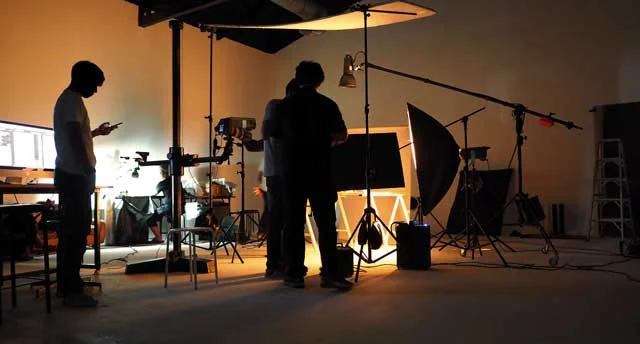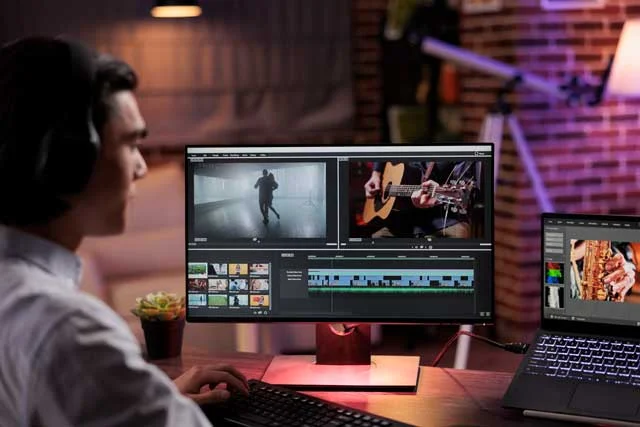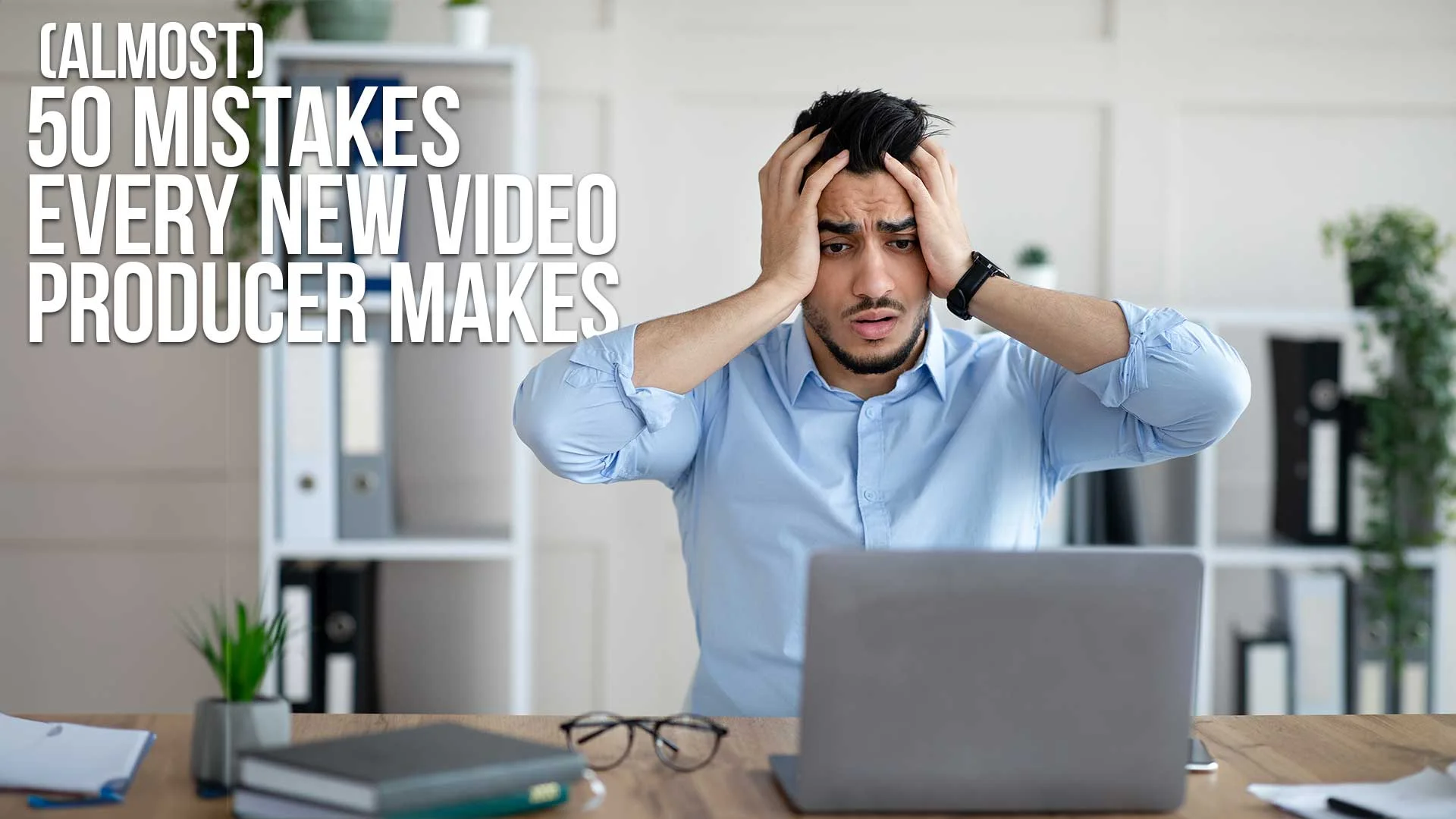I’ve been working in audio and video production for over 20 years.
I’ve made about every mistake you could think of.
Twice.
Here I’ve compiled a list of wisdom from over my years of what to avoid as a video producer throughout pre-production, production, post-production, and video delivery.
Interlinked within the tips are further reading topics.

Pre-Production
1. Not Understanding Your Audience
Diving into video production without considering your audience can lead to a disconnected final product. It’s not about just having a camera and an idea. Know your target audience, their preferences, and habits.
Ask your clients who their demographic is.
2. Skipping Pre-production Planning
Ever heard, “Fail to plan, plan to fail”? This saying rings especially true in video production. Scripting, scouting locations, and storyboarding are key. Without these, you risk a chaotic shoot day.
3. Not Allocating Enough Pre-production Time
Rushing into shooting can backfire. Plan, Scout, Storyboard.
4. Not Storyboarding
Storyboarding is the visual representation of your script. Skipping this can lead to missing shots or sequences that don’t flow well.
5. Avoiding Rehearsals
Rehearsing scenes, especially with actors, can save a lot of time on the day of the shoot and can lead to better performance.
6. Underestimating Budget Needs
An accurate budget prevents compromised quality. Get the right tools and people you need within your or your client’s budget.
7. Underestimating Pre-Production Time
Many rush into shooting without adequate preparation. Allocating enough time for pre-production ensures the actual shoot runs smoothly.
8. Skipping a Contract
A contract is there to protect yourself, your client, and whomever you hire.
9. Not budgeting for Insurance
When planning your budget, be sure to line item insurance. Your talent might require it. Your location might require it. And you might drop your camera, just sayin'.

Production
10. Ignoring Lighting
Lighting can make or break your video’s quality. While natural light is a fantastic resource, don’t rely on it alone. Understanding three-point lighting is a must.
11. Ignoring Room Tone
Recording ambient sound is essential for audio consistency. It only takes a few seconds and your sound person (see below) will thank you.
12. Poor Audio Quality
Viewers might tolerate sub-par video quality, but not poor audio. Investing in a good microphone and understanding the basics of sound recording can save you a lot of post-production headaches.
13. Skimping on a Sound Person
“I’ll just run audio myself” – big mistake. Hire a pro to get it done right.
14. Not Investing in a Good Tripod
Shaky footage can distract viewers. Tripods stabilize your camera, ensuring your shots are smooth and professional.
15. Using the Wrong Frame Rate
Different scenarios require different frame rates. For instance, action shots might benefit from higher frame rates, while others might not.
16. Ignoring White Balance
Incorrect white balance can give your footage an unnatural color tint. Always check and adjust white balance before recording.
17. Relying Solely on Auto-focus
Auto-focus can be inconsistent. Manual focus ensures the shot stays sharp and highlights what you intend.
18. Avoiding Multiple Takes
Doing multiple takes ensures you have choices during editing. It can also capture the progression of a performance, which may improve with repetition.
19. Not Using Manual Settings
Relying on auto camera settings can lead to inconsistent lighting and focus. Learning and using manual camera settings gives better control over the shot.
20. Not Labeling Footage While Shooting
Organizing and labeling footage saves a lot of time during editing. It helps you easily locate the shots you need.
21. Ignoring Aspect Ratios
Different platforms have different preferred aspect ratios. Ignoring this can lead to videos being cropped strangely or not fitting the frame properly.
22. Not Using External Monitors
Relying solely on your camera’s monitor can be misleading. An external monitor gives a clearer view of what’s being captured. See your white balance and your focus on a bigger screen
23. Failing to Backup Files in Production
It’s a nightmare scenario – all your hard work gone because you didn’t back up your files. Use external drives and cloud storage.
One is none, two is one, three is two.
24. Not Reviewing Footage Promptly
Reviewing footage only after the shoot may reveal mistakes. Check your clips on location. It’ll save you the cost of reshooting.

Post-Production
25. Not Prioritizing Storytelling
Graphics and effects are cool, but a compelling story is the heart of any video. Your audience should connect emotionally with your content.
26. Overusing Transitions
Fancy transitions may seem tempting. However, overdoing them can make your video look amateurish. Stick to the basics like cuts and fades.
27. Failing to Backup Files in Post
It’s a nightmare scenario – all your hard work gone because you didn’t back up your files. Use external drives and cloud storage.
28. Avoiding B-Roll Footage
B-roll footage adds depth to your primary shots. It provides context and makes your video more engaging. Use it to move your story along.
Try and use at least two b-roll shots at a time, not just one.
29. Not Editing Ruthlessly
It’s easy to fall in love with your footage. But not every shot serves the story. Trim ruthlessly. Less often means more. Don’t be precious.
30. Neglecting Video Length
Attention spans are short. If your video is too long and doesn’t engage viewers quickly, they’ll move on.
31. Forgetting Color Correction
Color correction ensures consistency throughout your video. It helps set the mood and tone, giving your project a polished look. Make some tweaks yourself or hire a colorist.
32. Missing Call-to-Actions
You’ve captured your audience’s attention. Now, what do you want them to do? Including a call-to-action makes sure your video has an impact.
33. Overlooking Music Licensing
You can’t just use any track you like. Ensure you have the rights to all music in your videos to avoid legal issues. When you purchase a royalty-free track, save the license. You’ll need it later when they sniff the song out on YouTube.
34. Over-relying on Post-production
Some new producers assume everything can be fixed in post-production. While many issues can be resolved, capturing the best possible shot initially is crucial.
35. Not Syncing Audio and Video
Misaligned audio and video can be distracting. Always ensure they’re perfectly synced. Let your NLE do it correctly.
36. Using Outdated Software
Video editing software is constantly updated. Using outdated versions can limit your editing capabilities and compatibility with your post-production team.
37. Not Seeking Feedback
Fresh eyes catch mistakes. Before finalizing your video, get feedback. Others might see something you missed.
38. Avoiding Feedback
Constructive feedback can improve the final output.
39. Know What Your Collaborators Need
It’s essential to know how to make the life easier of your editors, audio mixers, colorists, graphics designers, and visual effects artists.
40. Ignoring Final Audio Mix
Ensure audio levels are balanced and clear. Know the specs for your delivery platform - wrong YouTube levels will be irritating to the viewer. Wrong Broadcast levels will get your program sent back to you.

Delivery
41. Ignoring SEO
Just producing a video isn’t enough. Optimize it for search engines to reach a broader audience.
42. Relying on Default Export Settings
Customize export settings for best quality. Know the specs of whoever your video is ending up. Know your codecs and frame rates and quality settings.
43. Skipping Video Thumbnails
Thumbnails are the first impression. An engaging thumbnail can significantly increase your video’s click-through rate.
44. Overlooking Video Compression
Different platforms have optimal video compression settings. Understanding these ensures your video maintains quality while being easily uploadable.
45. Not Monitoring Analytics
Analytics provide insights into viewer behavior. By ignoring them, you miss opportunities to refine your content strategy.
The Most Important Mistake to Avoid
46. Not Continuously Learning Video production is evolving. Keeping up-to-date with the latest trends and techniques is essential. Don’t become obsolete.
Video Production Mistakes FAQ
What is the importance of pre-production?
Pre-production sets the foundation for your video. It involves planning every detail, ensuring you have a clear vision, saving both time and resources during production.
Why is storytelling crucial in video production?
Storytelling engages viewers emotionally. It’s the thread that ties your video together, ensuring your message is both clear and compelling.
How do I optimize my videos for search engines?
Optimizing videos for search engines involves selecting relevant keywords, writing compelling descriptions, and ensuring your content is easily shareable.
Are there legalities involved in video production?
Absolutely. From talent releases to music licenses, understanding the legal landscape ensures your production doesn’t face costly legal issues.
Can I use any music in my videos?
No. Using copyrighted music without permission can lead to legal troubles. Always secure the necessary licenses or use royalty-free tracks.
What’s the ideal length for a video?
It varies based on content and platform. However, keeping videos concise while conveying your message effectively is key.
How important is lighting in video production?
Lighting is crucial. It not only impacts the video’s mood and tone but also the perceived quality. Proper lighting ensures clarity and professionalism.
Why is audio quality so important?
Clear audio ensures your message is heard. Poor audio can turn viewers away, regardless of video quality.
What’s the purpose of a call-to-action in videos?
A call-to-action guides viewers on the next steps, whether it’s visiting a website, buying a product, or any other desired action.
How can I learn more about video production?
There are countless online courses, workshops, and resources. Staying updated with industry blogs, forums, and attending workshops can also help.

About the Author
Joseph Nilo has been working professionally in all aspects of audio and video production for over twenty years. His day-to-day work finds him working as a video editor, 2D and 3D motion graphics designer, voiceover artist and audio engineer, and colorist for corporate projects and feature films.
Video Editing Related Posts
Adobe Creative Cloud for Video Editing
Top 10 Video Editing Software for Mac
The Benefits of Dual-Monitor Setups for Video Editing
How to Choose the Right Video Editing Monitor for Your Needs
Best Monitors for Video Editing
Best Video Editing Software in 2023
Best Mac for Video Editing in 2023
(Almost) 50 Mistakes Every New Video Producer Makes
Breakthrough AI Tools: Elevate Your Video Production Game!
Table of Contents
- Pre-Production
- Production
- Post-Production
- Delivery
- The Most Important Mistake To Avoid
- Video Production Mistakes FAQ
Video Editing Related Posts
Adobe Creative Cloud for Video Editing
Top 10 Video Editing Software for Mac
The Benefits of Dual-Monitor Setups for Video Editing
How to Choose the Right Video Editing Monitor for Your Needs
Best Monitors for Video Editing
Best Video Editing Software in 2023
Best Mac for Video Editing in 2023
(Almost) 50 Mistakes Every New Video Producer Makes
Breakthrough AI Tools: Elevate Your Video Production Game!
